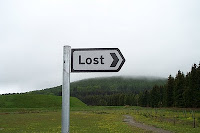The Thing About Being Lost
Christians call people who aren’t currently connected to God through Jesus “lost.” And I think there’s truth in that. The problem is that they sometimes say it in a derisive way, like it’s an insult. But there’s something we need to remember.
I was reminded of it once when my family was driving from Virginia Beach to Buffalo to see our parents. It was a journey we had made many times. My wife, Jen, was tired. She asked me to drive so she could sleep, making me promise not to wake her unless we got in an accident, and making me promise we wouldn’t get in an accident. I woke her up about two hours later.
“Did we get in an accident?” She was groggy, yet alarmed. (Which, by the way, sounds a lot like drunk and paranoid.)
“No, we’re lost.” I didn’t know if this was good or bad news.
“Lost! How can we be lost?” She was groggy, yet annoyed. (Which, by the way, sounds a lot like drunk and irate.”
“I don’t know, but we’re lost.”
“Well, how long has it been since you’ve known where we are?” She was groggy, yet calculating. (Which, by the way, sounds a lot like drunk and remorseful.)
I did some math in my head. “Probably an hour and a half.”
“An hour and a half?!” She was no longer groggy. “Where are we? Are we in New York yet?”
“Listen, Boo,” I thought using a friendly term of endearment might calm her down, “I have no idea what state we’re in. I’m not even sure we’re still on the east coast.”
“Don’t call me Boo!” she yelled. I decided I liked her better when she seemed drunk.
“Okay, Sir,” hoping a non-friendly term of respect might help, “But you do know, I didn’t get lost on purpose.”
That’s the thing about being lost. No one gets lost on purpose.

